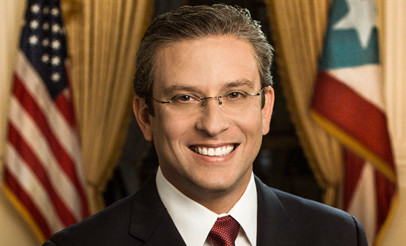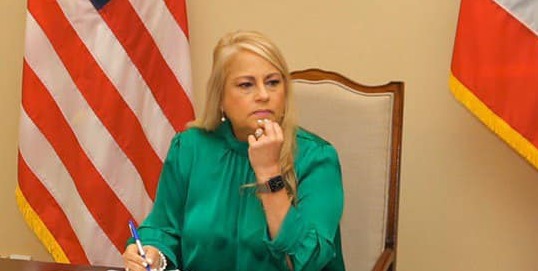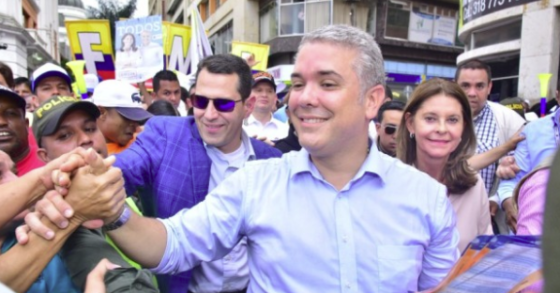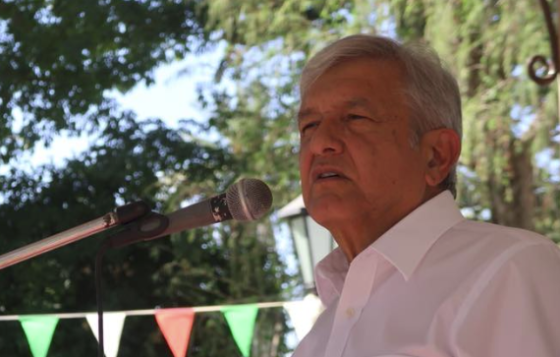
Will the US Heed Puerto Rico’s ‘Distress Call’?
Should the US government help Puerto Rico get out from under its debt? What is the best way to approach the task?
A Daily Publication of The Dialogue
The discovery of a facility holding unused emergency supplies, including water bottles, diapers and portable stoves, sparked a public outcry in Puerto Rico, as thousands continued to suffer from damages following a series of earthquakes earlier this month. Demonstrators gathered in San Juan to protest Governor Wanda Vázquez, who fired several officials, including the former chief of emergency management, shortly after the facility was found. Why did Puerto Rico’s government fail to distribute the aid? How could the incident affect future disbursements of federal funds for the U.S. territory? To what extent will the widespread outrage against Vázquez’s administration hinder her ability to govern?
Mayra Vélez Serrano, co-founder of the Minority Placement Program (MIGAP) and associate professor in the political science department of the University of Puerto Rico: “It is still not clear why the supplies were not distributed. In fact, before the facility was discovered, the mayor of Peñuelas—one of the most affected municipalities—said he knew about it and did not understand why supplies were not being used. However, when the scandal broke out, the agency in charge of managing the emergency, NMEAD, issued a statement saying citizens had not been denied the stored supplies, that there was no shortage of aid and that stored items were being distributed. However, both the mayors from affected municipalities and residents argued otherwise. The governor requested an investigation, giving a 48-hour deadline for the report’s completion. Yet results have not been disclosed, which has increased citizens’ distrust and indignation. Hours after the scandal erupted, Donald Trump Jr. tweeted, ‘So Trump was right after all!!! As usual,’ reinforcing Washington’s prejudices on the incompetence and corruption that have characterized the current government. The governor’s decision to request the resignation of several key officials who were in the process of reconstruction following Hurricane Maria will affect still-owed post-hurricane disbursements of federal funds. One of these officials is former Housing Secretary Antonio Gil Enseñat, who has struggled to gain the trust of the U.S. Department of Housing and Urban Development to achieve the disbursement of more than $16 billion that the U.S. Congress allocated for Puerto Rico after the hurricane. HUD has stalled disbursements by establishing conditions that other jurisdictions affected by natural disasters did not have. Unfortunately, the scandal will affect both the unfinished projects from Hurricane Maria and any future disbursements in case of another natural disaster. The scandal has consumed Wanda Vázquez. Her attention has been focused on assigning responsibility for the scandal, which has undermined her ability to assist the thousands of people who lost their homes. The fact that Vázquez seeks to be nominated as a candidate for her party’s primaries has made her focus on the optics of her response to the disaster, and not on the proper logistics for assistance.”
Kenneth McClintock, senior policy advisor at Politank and former secretary of state and lieutenant governor of Puerto Rico: “For several months, some activist groups that participated in the successful ‘Summer of ‘19’ protests that forced the resignation of Puerto Rico’s elected governor have been testing the waters to find an issue that will take hold to force the governor’s successor, Wanda Vázquez, to resign. During Puerto Rico’s current seismic crisis, a convicted felon who moved from Florida to Puerto Rico thought he had found a ‘secret’ warehouse, but it wasn’t secret since it had been publicly announced in 2018. He said it contained expired disaster relief supplies dating to Hurricane Maria, which was not quite true because the warehouse was opened almost a year after Maria. Despite that, activists tried to ‘market-test’ that alleged ‘scandal’ to push the governor out. Despite calls to protest by Ricky Martín and other VIPs, fewer than a thousand activists showed up. Their frustration led to very counterproductive violent acts, such as vandalizing a TV news vehicle and burning our national flag, which symbolizes the citizenship that more than 90 percent of Americans in Puerto Rico treasure. The governor is spearheading efforts to distribute aid to tens of thousands of quake victims displaced from their damaged homes, and it is pushing the federal government to speed up supplies and other help to the towns near the cluster of epicenters of the thousands of tremors since Dec. 28. Vázquez has taken a hit during her gubernatorial primary campaign against former Resident Commissioner Pedro Pierluisi, but nothing that will force her to resign her governorship.”
Jacqueline Font-Guzmán, author and professor of law and conflict studies in the Department of Interdisciplinary Studies at Creighton University Graduate School in Omaha: “A government presupposes an organized system that takes responsibility for the well-being of the governed. After Hurricane Maria, Puerto Ricans learned that they could not rely on the local government because there is no local government. Confronted with this reality, what Governor Wanda Vázquez should have done was exercise leadership. Unfortunately, Vázquez has shown her incapacity to lead, and outraged protesters want her resignation. Exuding disdain and a condescending tone, Vázquez indicated in a recent interview that people in the makeshift camps are ‘happy and have what they need.’ In reality, they are traumatized and scared of their uncertain future. It is yet to be seen whether Vázquez is ousted as governor—like her predecessor—or voted out in the upcoming election in November. In the meantime, Puerto Ricans will have to continue to rely on their community networks to survive. Amid a humanitarian crisis, Puerto Rico’s future is dire. Armed with audacious ignorance, the U.S. government promotes an imperialistic narrative that Puerto Ricans are incapable of managing FEMA funds. Yet, up to this point, only FEMA officials have been indicted for mismanagement of federal funds after Hurricane Maria. The federal aid restrictions imposed by the Trump administration have little to do with the governor’s lack of leadership or its nonexistent government. The federal aid restrictions imposed upon Puerto Ricans are rooted in centuries of colonialism and the U.S. government’s incapacity to see themselves for what they are, an empire with colonial subjects.”
Julio López Varona, co-director of Community Dignity Campaigns at The Center for Popular Democracy: “For years, community groups have raised concerns about how the current administration and administrations before that have moved forward with an agenda that prioritizes neoliberal, austerity-driven policies as a solution to Puerto Rico’s debt problems. Those policies have drastically cut budgets and services, crippling the island’s infrastructure. The government’s failure to respond to natural disasters that led to the aid not being properly distributed is directly connected to these policies. As the island was hit by hurricanes and earthquakes, the infrastructure and personnel necessary to respond was compromised. At the same time, a longstanding two-party system driven by nepotism and corruption worsened the situation. The federal government’s lack of response to Hurricane Maria made it crystal clear that this administration does not care about Puerto Rico. The island’s colonial status limits its ability to have proper representation, which forces it to beg for what should be rightfully provided. To make matters worse, the administration has used the allegations of corruption to justify its blatant disregard for the suffering of the territory’s people. Currently, Governor Vázquez faces her greatest challenge. As the replacement of a failed governor driven out by allegations of corruption (which include her), how she works and listens to community groups that have led recovery efforts will determine her ability to govern. However, recent police attacks on protesters and continued efforts to disregard allegations of corruption point to an administration that is on the defense and not ready to look for solutions that help bring together the community and return legitimacy to the government.”
Beatrice Rangel, member of the Advisor board and director of AMLA Consulting in Miami Beach: “Puerto Rico’s economic troubles are nothing new, and these troubles spring from its political status. Puerto Rico’s political status prevents it from fully integrating into the U.S. economy and from benefiting from the U.S. development path. Measures to boost economic growth have not gone anywhere near the objective of creating an autonomous and growth-oriented private sector. Tax incentives have not led to expected results. Without participating in overall U.S. trade policy, the island will not even be able to capture the benefits of the upcoming development of the Caribbean Basin. Without resolving the statehood dilemma, Puerto Rico will continue to be the hut in an affluent neighborhood, and its elected officials will never be able to deliver on the aspirations of their people to enjoy a better standard of life.”
 The Latin America Advisor features Q&A from leaders in politics, economics, and finance every business day. It is available to members of the Dialogue’s Corporate Program and others by subscription.
The Latin America Advisor features Q&A from leaders in politics, economics, and finance every business day. It is available to members of the Dialogue’s Corporate Program and others by subscription.
Should the US government help Puerto Rico get out from under its debt? What is the best way to approach the task?
Iván Duque, a conservative former senator, on Sunday won Colombia’s presidential runoff election. What does it mean for the country?
Mexicans go to the polls on Sunday, July 1, for the country’s presidential, legislative and local elections. What can we expect?
 Protesters have criticized Puerto Rico Governor Wanda Vázquez over aid that was undistributed following Hurricane Maria in 2017. // File Photo: Commonwealth of Puerto Rico.
Protesters have criticized Puerto Rico Governor Wanda Vázquez over aid that was undistributed following Hurricane Maria in 2017. // File Photo: Commonwealth of Puerto Rico.

